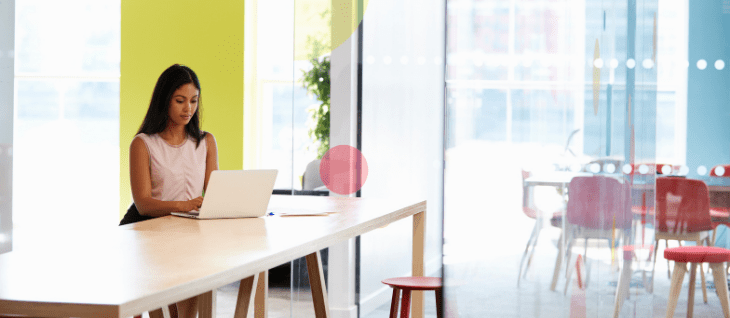For many years now the media has been obsessed with millennials – but their time in the spotlight is over; it’s time for Generation Z to make their mark on the corporate world.
This new generation of digital natives has unique characteristics and ways of working, and workplace technology can help foster the right kind of agile environment that dovetails with their particular needs.
A new generation entering the world of work
The young people born between 1996 and 2010 aka Generation Z now make up over 20% of the global workforce. They already outnumber millennials in the workplace and while they are both young they differ in some ways.
Employers will need to shift their emphasis to attracting and engaging this young talent.
The defining characteristics of Generation Z include their sense of community, a commitment to diversity and inclusivity as well as a search for meaning. Like millennials before them they are digital-first and spend a great deal of time on social media.
Here are the 5 key ways to appeal to Gen Z:
1. Cater for their digital preferences – As they are digital natives, Gen Z are used to consuming huge amounts of content. Any messaging aimed at them needs to cut through all the noise. Similarly, you need to reach out to them on channels such as Snap or YouTube as opposed to more traditional platforms like LinkedIn or Facebook.
Think also about the IT infrastructure of your office space – a survey by Dell found that 91% of their Gen Z respondents would be influenced by the technology available to them when deciding between two competing job offers.
2. Engage face to face – They’re digital, but they also crave face to face interaction more than any other generation. According to a survey by the World Economic Forum (WEF), 72 percent of Gen Z prefer face-to-face conversation in the workplace.
To get the best performance out of this generation, you need to create an open, collaborative environment where they can regularly meet with their managers. The Dell study also found that 53% would prefer to work from the office than at home.
3. Foster autonomy – In research by Forbes, 88% cited being happy, and 73% cited having good work-life balance as the biggest measures of success.
Members of Gen Z also said the most important trait a good boss can possess is respect for work hours. These numbers suggest that as much as Generation Z values security, they also expect a high degree of autonomy in their work.
4. Change your office layout – Layout can be overlooked. While millennials may have been attracted to ping-pong tables, unassigned hot desks and on-site gyms, these are not high on Generation Z’s list of priorities.
A study by contract furniture specialists Ki found that Generation Z are looking for something akin to their college style of working – a quiet personalized space to work, with areas for socialization. The open plan and activity-based designs that many organizations insist on creating may affect their productivity.
Create areas where they can work quietly on their own as well as areas where they can collaborate with their teams. Some organizations are creating neighbourhoods of desks where teams can co-locate as well as providing the correct acoustics for impromptu video calls.
Also, create a hoteling policy. Engineer a policy of pre-assigned desks as opposed to the more free-wheeling style of hot desking. While a desk for life may not be feasible, give them the opportunity to have some stability and peace in their working environment.
5. Invest in technology – it’s important to their choice of employment, so make sure you provide the tools they need to thrive as well as encourage them to bring their own devices to work. Look at using platforms such as Slack which feed into their love of instant messaging.
To create an agile working experience invest in video-conference enabled rooms so they can easily interact with their managers and distributed teams.
How agile booking technology can help
For workplace leaders catering for today’s multi-generational workforces, agile booking technology can help in a number of key areas:

Hoteling – using a mobile app, workers can easily book their own desks and using features like “find a colleague” they can easily locate their managers for a face-to-face meeting.
Wellbeing – Features like booking from a socially distanced floorplan reassure your staff that they are going to be safe. No touch check-in/out of desks using QR code scanners or RFID readers also gives extra reassurance as do desk sensors which indicate when desks are available, blocked or being cleaned.
Videoconferencing – this will get bigger as organizations move to hybrid working and the technology becomes more mainstream. Look for a booking app that works seamlessly with VC-enabled rooms so that this generation gets the face-t- face feedback that they need to be productive as well as creating a great digital experience for your distributed workforce.
Space utilization – with more options for reconfiguring space coming on stream every day you need to be able to pinpoint how space is actually being used. Armed with this data you can then make informed decisions about how you reconfigure your space. For example, if a large meeting room is not being fully occupied eight hours a day would it be better used as a pivot office with desks?
Flexibility – you may not want to change your office space immediately, but it’s good to have some flexibility to meet demand for desks and to allow for social distancing. Look at desk booking software with reverse hoteling features that enables you to put, say, unused corner offices to good use when extra desk space is needed.
Creating a great user experience – Generation Z value their time and their work life balance and they enjoy technology. Give them an easy to use, yet powerful desk booking software app and they can plan their whole day quickly – from booking meetings to securing a hot desk to arranging catering and AV – giving them the reassurance that everything is organized and time-efficient.
Conclusion
Generation Z are on their way, bringing a different set of needs you need to address. What worked for the millennials may not quite hit the mark for them.
By carefully planning your office layout, thinking about the technology needed going forward and putting in the desk booking software to manage their workspace you can make them feel valued, and create a safe and engaging environment while helping them to lead productive working lives.

